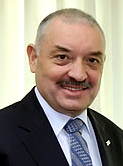Money cannot buy you happiness. That is what is sometimes said, and a recent Gallup poll suggests the happiest people on Earth are not in Luxembourg ― the wealthiest country in the world, according to World Bank estimates ― but in mostly rural, mostly poor Paraguay.
Paraguayan Ambassador to Korea Ceferino Valdez said it is because of a quintessentially Paraguayan sentiment described colloquially as “tranquilo pa,” which is a combination of the Spanish word for tranquility and the Guarani “pa.”
Paraguayan Ambassador to Korea Ceferino Valdez said it is because of a quintessentially Paraguayan sentiment described colloquially as “tranquilo pa,” which is a combination of the Spanish word for tranquility and the Guarani “pa.”

Valdez said that although “tranquilo pa” is a sentiment that defies definition, the best way to think of it is perhaps as a laid-back and easygoing approach toward life.
“Tranquilo pa” puts life’s stresses and hardships into perspective without foregoing duties and responsibilities, those things in life all people have.
“It does not mean playing all the time and never working,” he said in an interview with The Korea Herald at a local eatery in Hannam-dong, a district of Seoul that is home to many of the foreign chanceries and diplomatic missions in Korea.
“You should maintain balance in your life. Take things in moderation, value friends and family. Just find your own balance of work and study with your family and, very importantly for Paraguayans, friendship,” he said. “It is no esoteric philosophy.”
Gallup measured positive emotions of nearly 150,000 people in 148 countries and areas using five questions.
These questions ask people whether they experienced a lot of enjoyment the day before the survey and whether they felt respected, well rested, laughed and smiled a lot, and did or learned something interesting.
In Paraguay, 85 percent of those polled said yes to all five, putting that country at the top of the list.
The poll, released in December, said seven of the world’s 10 countries with the most positive attitudes are in Latin America, including Paraguay, Panama, El Salvador, Venezuela, Guatemala, Ecuador and Costa Rica.
In fact, people least likely to report positive emotions live in super-rich Singapore. Just 46 percent of those surveyed either reported positive feelings, said they did something enjoyable and interesting the day before, or said they laughed or smiled.
People from some countries reporting the least positive feelings were not surprising, however, such as war-torn Iraq and Afghanistan, and Yemen and Haiti, two countries suffering from civil unrest and divisions.
But many people who live in wealthy nations with routinely good marks on quantitative measurements like human development indexes reported feelings of unhappiness about life.
Wealthy countries sat surprisingly low on the Gallup list. Many rich European countries did not even make the top 20 list of happy people. Korea appears to be awash with many unhappy people as well; the East Asian economic and pop culture powerhouse ranked with the bottom 50 countries.
That may not be a surprise in a country with a disturbingly high rate of suicide, the highest among the nations of the Organization of Economic Cooperation and Development. Suicide has become one of main causes of death in Korea, according to one report.
The idea of measuring happiness grew out of a relatively new and controversial field called “happiness economics,” which seeks to measure government social policy by adding people’s perceptions of well-being, their feelings about and satisfaction with life ― put simply, their happiness. As people in rich countries are beginning to want some of the good life now, happiness is becoming a serious issue for policy makers.
British Prime Minister David Cameron announced a national well-being program in 2010 as part of a pledge to improve Britons’ lives in the wake of the global recession.
In Korea, President-elect Park Geun-hye pledged to usher in an “era of happiness in Korea,” and to even set up a happiness committee to look into it.
But critics are quick to point out that an emphasis on hard-to-define feelings could allow governments to use positive public perceptions as an excuse to ignore problems.
These critics often charge that establishing happiness as a metric is only meant to serve political goals and could even be used to justify authoritarian rule.
Regardless of the controversy, even among happiness economists ― when they gathered for a conference in Italy not too long ago, they could not agree on a definition or how to measure it accurately ― governments around the world are starting to use happiness as a way to judge progress.
“It is a feeling of contentment that derives from following a natural way of life. We follow the flow of the river, the green of the forest, the warmth of the sun,” Valdez said.
He suggested that if there is one thing that might be a unique preoccupation for Paraguayans it is the importance they place on friendship. Paraguay even sponsored a resolution in the United Nations General Assembly that makes July 30 the International Day of Friendship.
For Valdez, however, happiness is simply a way of life in Paraguay. “It means for us our permanent happy feeling. We are happy because that’s the way we are: ‘vivir para ser’ (live to be).”
By Philip Iglauer (ephilip2011@heraldcorp.com)
-
Articles by Korea Herald



















